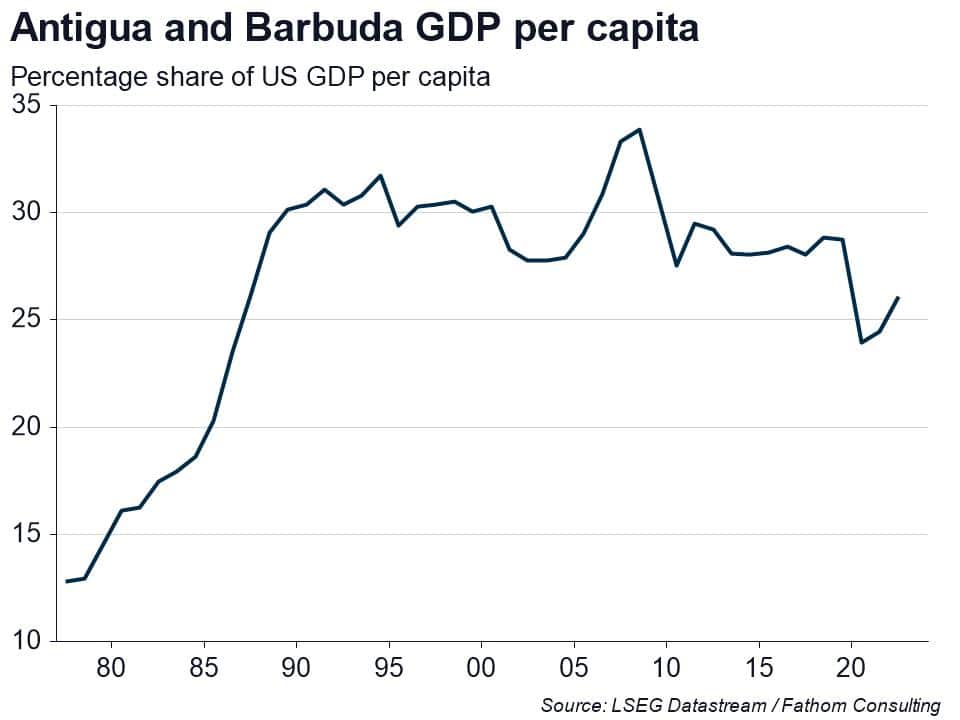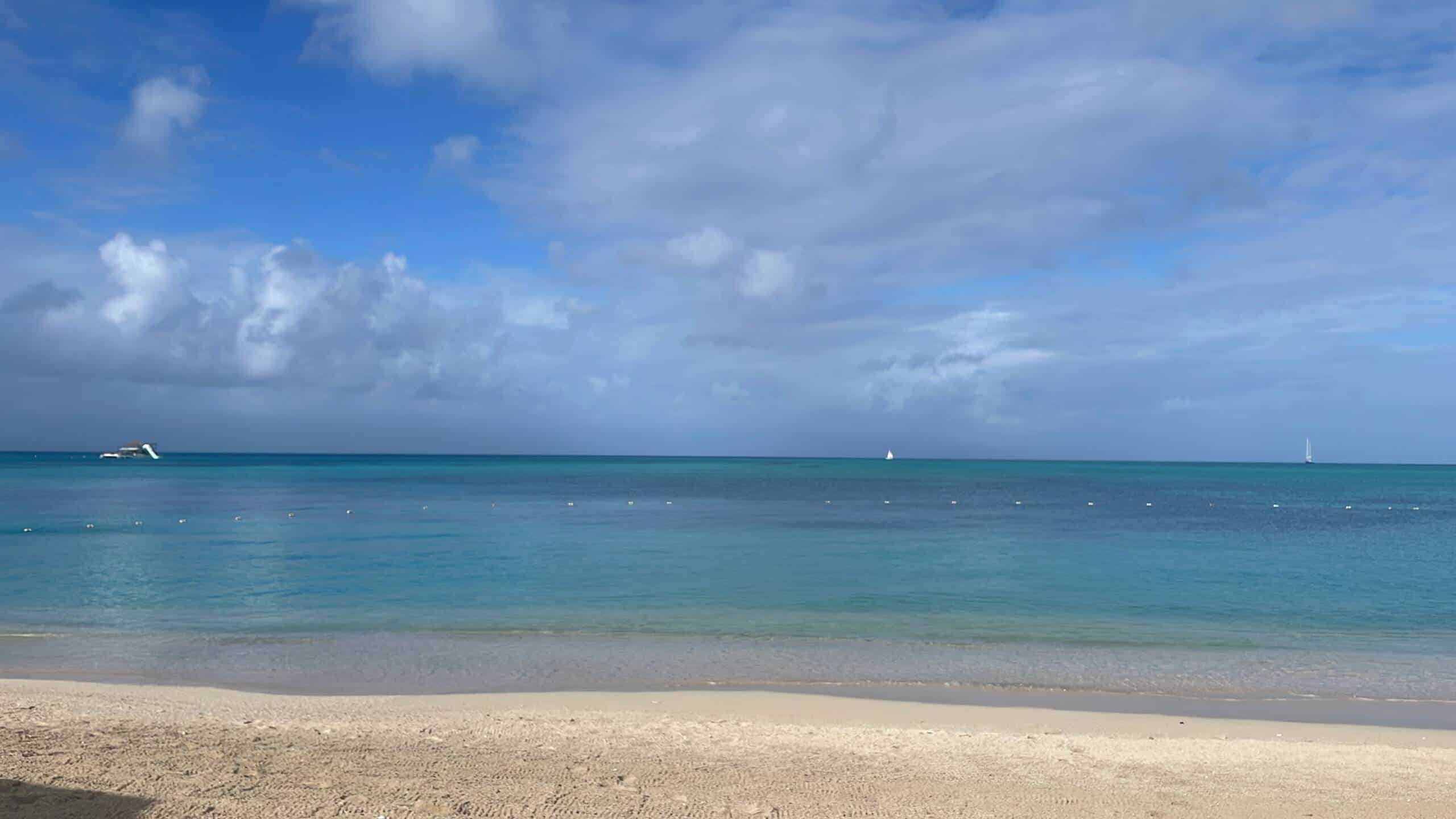A sideways look at economics
Lying on a lounger in the shade on a beach in Antigua, glass of piña colada in hand, a good book dog-eared on the table next to me, looking at the turquoise and ultramarine sea and the pale gold sand, the white nicks of sails on the horizon, watching a squadron of pelicans skimming the swell, and the bright yellow bananaquits or iridescent hummingbirds flitting around the dark green foliage: there’s not much better in life than that. At least, not in my life.
Antigua is one of the wealthier Caribbean islands, but it is still poor, once you venture beyond the resorts that punctuate the coastline. This is a contradiction that bothers me to an increasing degree each time I visit (I’ve been there a few times, sorry not sorry).
For the most part, the resorts are owned by citizens of countries outside Antigua. The employees tend to be locals, but the profits generated by the resorts flow abroad. And the standard of living afforded to the locals is low, in stark contrast to the luxury enjoyed by the guests at the resorts, myself included. Antigua should be paradise, not just for lucky visitors but also for those who live there. To paraphrase Churchill, they should have won first prize in the lottery of life simply by being born Antiguan. Why isn’t it so?

During my lengthy rests on the beach, I ponder this question. Usually, that train of thought is triggered by the arrival of a cruise ship, whose thousands of passengers are deposited for the day on the island and turn up to spoil the view and the peace on ‘my’ beach (in fact, all the beaches in Antigua are public beaches, but I have feelings about this one).
My opinions on this matter are obviously coloured by my own preferences and privileges, though I do my best to see past them.
The Antiguan economy relies on tourism. Nearly everything that is not directly related to tourism is related indirectly. The people of Antigua need jobs and tourism provides them. I am a frequent tourist there so, in a small way, I contribute to that.
In a small way, though, I also contribute to the negative impacts of tourism: the impacts on the environment.
I visit Antigua because it is beautiful, the people are friendly, the resort I favour is a joy, and the climate (in season) suits me perfectly. Those are the same factors that drive other tourists, including those on the cruise ships. I often find myself in an internal, imagined dialogue like this.
Me (to someone from the cruise ship): “Why have you come to Antigua?”
My imagined interlocutor: “It’s one of the stops on the cruise, and I love the Caribbean.”
- “Me too. What is it about the Caribbean that you love?”
- “The weather, the beaches, how beautiful it is. The people. The rum.”
- “If it wasn’t beautiful like that, would you come just for the weather and the rest?”
- “No, I don’t think so – you can get good weather in Europe, much cheaper. And nice people, booze.”
- “So you’re here, specifically here, because it’s beautiful.”
- “Yes I guess so – beautiful and you know, different from Europe. I like to see the world.”
- “But you don’t go on cruises to ugly places I suppose?”
- “No I don’t.”
- “How much do you spend when you’re here?”
- “Oh, nothing. The cruise is all-inclusive. How much do you spend?”
- “Loads, these resorts cost a lot, especially all-inclusive ones.”
- “Right but how much of that goes to the people of Antigua?”
- “Very little it seems – just what the employees get paid, which is not nothing, but not much either.”
- “Right so it’s not much different from a cruise in that respect? I don’t spend money here but the cruise company does. We have to dock. We have to be transported across the island. We have to have loungers provided. People get paid for all that stuff.”
- “I suppose so.”
That’s the first imagined encounter. I wind up, after another sip or three of my piña colada, feeling that there is no fundamental distinction between me and those on the cruise ship. We’re both doing the same thing, both having roughly the same impact on the Antiguan economy and environment.
But then, after a decent interval, I am hit by l’esprit de l’escalier, and it occurs to me what I should have said.
Me (again): “But aren’t you worried about the damage that you do to the environment? The extent to which your visit makes the place less beautiful?”
Interlocutor: “A little, maybe. Are you?”
- “Fair – yes I am. I like resorts that try to minimise that damage but, realistically, I reckon the bulk of it is still there.”
- “Same here. I think the mess I create should be the responsibility of the cruise company and cleaning it up factored into the price of the cruise. But I expect that’s not done well, and in truth I do care about the price I pay. I think most people do.”
- “So I think you and I have roughly the same positive impact on the Antiguan economy for each day we’re here (pretty small), and we generate roughly the same negative externalities too.”
- “Sounds about right.”
- “But there’s a difference between high-end, exclusive resorts and mass tourism, isn’t there? A difference in the environmental impact.”
- “Yes. You guys in your exclusive resorts are creating waste and chewing up the reefs and allowing your sunscreen to pollute the water and necessitating the use of plastic and detergent and so on day in, day out. For us, most of that crap is kept on the boat.”
- “True, but we are few and you are many.”
- “So we win!”
- “But the island loses. And, in the end, it loses the very thing that keeps you lot coming: its beauty.”
- “Hark! That’s what keeps you coming too!”
- “Correct, but if the island were exclusive, not just the resorts but the whole island, then its beauty would be sustainable. Whereas so long as it’s open to mass tourism, its beauty will degrade over time. The reefs will die. The flora and fauna will die. The beaches will be litter-strewn deserts. You will end up killing the thing you love.”
Three sips later, or five, and I’ve persuaded myself that my choices are not just happy for me but also morally defensible. I drop my guard. Then, my interlocutor experiences their own flash of staircase wit.
Interlocutor: “What you’re suggesting, really, is that people like me who can’t afford to stay in high-end exclusive resorts should be, well, excluded from experiencing this place altogether. That’s what the word ‘exclusive’ means, right? All very well if you’re in the club but what if you aren’t? And that is the vast majority. Keep the plebs out, right, so that you lot can enjoy paradise in peace.”
- “Yes, I suppose it is, though I wouldn’t put it like that. But isn’t it better all round if mass tourism sticks to less fragile environments that can handle it? That we enjoy the things that can be enjoyed without killing them?”
- “Yeah, but you don’t mean ‘we’. You mean ‘you’. ‘You lot in your filthy cruise ships: know your place’ — that’s what you mean.”
My interlocutor has a point. A good one. One that requires a re-up of my drink and a quick visit to the loo. A reapplication of my sunscreen. Perhaps even a paddle: observe the shoals of tiny pale fish skittering away in the shallows as I approach. I notice that the beach has changed since yesterday: the sharp dip that was present within a couple of feet of the water’s edge has disappeared. This scouring, shifting, reforming is a constant process, the only constant here.
Here comes the economist’s move. The knight’s move.
Me: “We need to get over ourselves. It’s not about us. It’s about the island and the people of the island. What’s best for them.”
Interlocutor: “Well, I suppose it’s whatever is happening now, right, this kind of mix – some high-end resorts, some cruise ships but not too many. That must be what they judge to be best. It’s a democracy, right, so I guess in the end they get what they want.”
- “Maybe. But it’s a stretch, usually, to say that whatever choices an elected government makes must be in the interests of the electorate. That’s the social choice problem, right there. And Arrow showed…”
- “Wait, what? You’re talking jargon. I just came here for a drink.”
- “Fair point. I’m saying, governments, even democratically elected ones, don’t always make the right choices, and it’s pretty hard to define what the right choice would be. I think the choices they make will change, it changes all the time. Like the beach. And those changes should be guided not by what you or I would like but by what’s best for the islanders and for the island, which is probably the same thing in the end. That’s all.”
- “Hard to disagree. Can I have my drink now?”
Nobody quite knows how markets clear, but we know that they do, for the most part. We invent, for the sake of our models, invisible hands or Walrasian auctioneers and imagined processes like tatonnement. These are analytical devices that amount to saying: markets clear. We know they don’t exist; but we also know that markets clear.
I think the same is probably true for social choice. Arrow and Debreu (1954) showed that there is no system of democratic representation that can reliably honour the preferences of the people it represents (except for dictatorship, and then it’s a democracy with only one voter). And yet, moved so to speak by the tides, the wind and the waves, my sense is that the choices democracies (however designed) make eventually shuffle towards a reasonable representation of the preferences of the electorate, for better or worse. This is essentially a poorly articulated and untested extension of the famous ‘Coase theorem’, which argues that the market will find a way to cope with negative externalities on its own, without regulation, as long as property rights are clearly defined and respected and ‘transaction costs’ (the costs of making a market between the polluter and those negatively affected by pollution for example) are very small. Usually, the Coase theorem is rejected as a realistic picture of the world since the transaction costs are not small.
In the imagined dialogue above, the market that needs making might be between me and my imagined interlocutor: how much would I pay them not to come? Or between the owners of the high-end resorts and the cruise companies: ditto. Or, as I was getting to at the end, between the elected representatives of the islanders and the tourists writ large who want to visit. My sense is that, over a long period of time, that market is made and can clear and, ultimately, it will clear in a way that the islanders like.
Not always, but usually, and only after many wrong turns along the way. No doubt the process can be accelerated to gradually achieve a higher degree of fidelity to the underlying preferences of the electorate, with careful thought and guidance. I hope that’s true in Antigua. In the meantime I will continue to visit when I can.
I return to my dog-eared book, which is the memoir of Amartya Sen, the great pioneer of social choice theory. Highly recommended.

More by this author